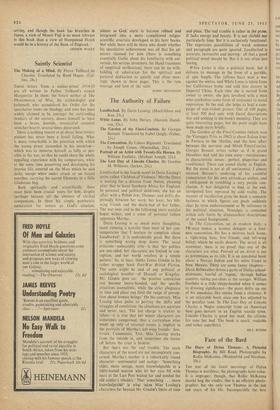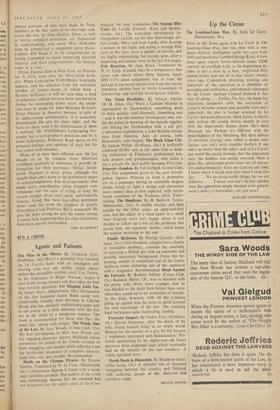Face of the Bard
The Days of Dylan Thomas: A Pictorial Biography. By Bill Read. Photographs by Rollie McKenna. (Weidenfeld and Nicolson, 30s.)
THE text of the latest necrology of Dylan Thomas is worthless; the photographs have value. It is improper, though, that Rollie McKenna should hog the credits. She is an efficient photo- grapher, but she only saw Thomas in the last sad years of his life. Incomparably the best Camera portraits of him were made by Nora Summers in the first years of his marriage, and,
nearer the end, by John Deakin. These, as well as having technical perfection, are illuminated by understanding, and make Miss McKenna seem by comparison a competent press photo- grapher. Bill Read is to be congratulated on having assembled so much interesting pictorial material; and there congratulations, like history, come to a stop.
Dylan Thomas died in New York on Novem- ber 9, 1953, soon after his thirty-ninth birth- day. When Constantine FitzGibbon's biography appears, and his selection from the enormous number of letters—many of which have a Byronic brilliance•—it will be seen what a load of subjective rubbish we have been smothered in during the intervening dozen years. An excep- tion must be made for John Malcolm Brinnin's Dylan Thomas in America, because, in spite of its embarrassing sentimentality, it is accurately documented. He gets his dates right; and the facts are there, even if his interpretation of them is dubious. Mr. FitzGibbon's forthcoming bio- graphy has a cartographer's precision and he is never lachrymose. Professor Read spares us his personal feelings and opinions (if any), but his text crawls with mistakes.
Many of us have been afflicted over the last decade or so by requests from American scribblers, academic or otherwise, to provide in- formation for their particular 'Dylan' hotch- potch. Payment is never given, although one usually finds one's name in the preliminary pages of acknowledgements. This does not matter. One made one's contribution—often frequent con- tributions—for the sake of trying to keep the record straight about one's dead, unfortunately famous, friend. But these log-rolling gentlemen never send One even the roughest of proofs. Everything I told Professor Bill is misquoted. He gets the dates wrong, he gets the names wrong. I cannot help suspecting that his other informants have been equally mishandled.
JOHN DAVENPORT







































 Previous page
Previous page